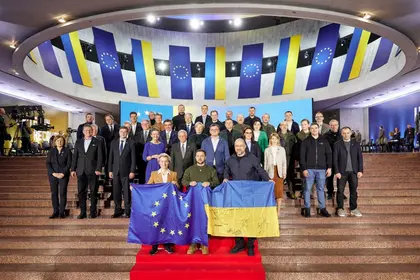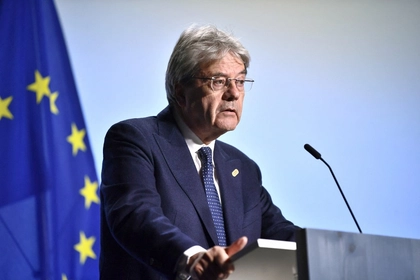Ukraine will host a key summit with the European Union on Friday, with President Volodymyr Zelensky saying he wants to hold talks “this year” on his war-battered country joining the bloc.
EU leaders granted candidate status to Ukraine in June last year, just months after Russia sent troops into the pro-Western country. But the path to full membership remains long, and could take years.
JOIN US ON TELEGRAM
Follow our coverage of the war on the @Kyivpost_official.
The bloc’s chief Ursula von der Leyen arrived in Ukraine’s capital Kyiv on Thursday with the EU’s most senior diplomat, Josep Borrell.
“I believe that Ukraine deserves to start negotiations on EU membership this year,” Zelensky said Thursday after talks with von der Leyen.
“Only together a strong Ukraine and a strong European Union can protect the life we value.”
Earlier this week, Ukraine expanded anti-corruption efforts by raiding the residences of an oligarch and a former interior minister, a key issue for Kyiv to secure approval to join the EU.
Von der Leyen tweeted that Ukraine was “taking notable steps forward to meet our recommendations, while at the same time fighting an invasion”.
“We have never been closer,” she said, noting that the EU was “working on extending tariff-free access to our market”.
Ukraine’s Prime Minister Denys Shmygal has called holding the summit in the capital “a powerful signal to both partners and enemies”.

Kuleba Talks Peace in China – Bohdan Nahaylo
The country has secured promises from the West for deliveries of modern battle tanks to fight Russian forces, and Kyiv is now asking for long-range missiles and fighter jets.
Russian President Vladimir Putin lashed out against Germany for promising tanks to Kyiv.
At a ceremony commemorating the Red Army’s victory against Nazi troops 80 years ago in Stalingrad, he said: “It’s unbelievable but true. We are again being threatened by German Leopard tanks.”
- Fresh offensive feared -
On the front line, Russian forces are pressing Ukrainian troops in the eastern Donetsk region, now the epicentre of fighting.
Moscow has been trying to seize control of Bakhmut in the industrial region for months in what has become the longest and bloodiest battle of the invasion.
Residents who remain in war-scarred Bakhmut told AFP they would not budge if the Russians arrive.
“How could I leave?” said 75-year-old Natalia Shevchenko.
She said she spends so much time sheltering from bombardments in her basement that she feels “like a mole” as she steps out into the light and her eyes adjust.
“Don’t worry,” she told AFP as shells whistled in the background.
“They’re far away. I’ve now learnt where they’re going.”
Russian forces have also been shelling the southern region of Kherson, after withdrawing its forces from the region’s main city last year.
But Zelensky has warned that the Kremlin is consolidating its forces for a fresh offensive.
Russia is “preparing to try to take revenge, not only against Ukraine, but against a free Europe and the free world”, he told a Thursday press conference.
Von der Leyen said the EU was looking to finalise fresh sanctions against Russia by February 24, the first anniversary of the conflict’s start.
Putin has insisted that Russia is weathering the barrage of sanctions imposed by Ukraine’s Western allies and will continue its military campaign in Ukraine.
But von der Leyen said sanctions were already “eroding” Russia’s economy, “throwing it back by a generation”.
She estimated that an existing oil price cap alone was costing Moscow around 160 million euros every day.
“We will introduce with our G7 partners an additional price cap on Russian petroleum products and by the 24th of February -- exactly one year since the invasion started -- we aim to have the 10th package of sanctions in place,” she said.
You can also highlight the text and press Ctrl + Enter






